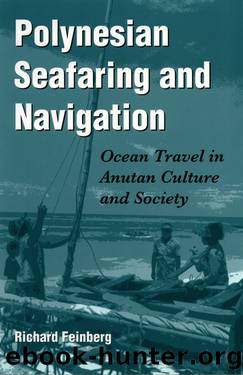Polynesian Seafaring and Navigation by Richard Feinberg

Author:Richard Feinberg
Language: eng
Format: epub
Publisher: The Kent State University Press
CREW SELECTION AND BEHAVIOR
When a canoe is taken out to sea, a crew must be established. An organizer, who usually is but need not be a tangata tau vaka of the vessel, speaks informally to others about his wish to constitute a fishing party. Participation is voluntary, although it is expected that over time, all adult males will do their part to contribute to the islandâs fish supply and if someone particularly wants to partake in the expedition, room usually can be found. When asked, Anutans deny the existence of any particular rules governing who fishes with whom, insisting that it is purely at the discretion of the individuals involved. In fact, the composition of a crew seems to be largely arbitrary and based on spur-of-the-moment predilections. On numerous occasions, I had appointments broken because my would-be informant was accosted at the last moment and talked into an unanticipated fishing trip. And I myself was many times approached by a prospective fisherman and asked to join an expedition that was about to depart. Nonetheless, careful examination of crew composition does yield some significant patterns.
Clearly, not all men participate equally in fishing expeditions. Some take every opportunity to go to sea, while others prefer to spend time gardening, house-building, or in canoe construction. Sometimes a man who has been sailing regularly will skip a day or two because of other responsibilities. And at times, a man who has not been fishing will take advantage of a vacancy in a canoe to spend a day at sea. Moreover, the types of kin who fish together are extremely varied. Not only may cousins of all degrees, on both sides and both cross-and parallel, find themselves fishing together, but members of adjacent generations, and inlaws of all kinds and degrees may freely participate in the same fishing expedition as well. Yet, it is extremely rare for two men from the same patongia to take part in the same expedition. In a random sample of seventeen fishing canoes during the course of my first visit to Anuta, a total of fifty-seven men went to sea. Of those, there were only two cases of brothers fishing on the same day, and both of these involved unusual circumstances. However, if a man should feel it necessary to take a day off from his fishing responsibilities, it is most appropriate for him to be replaced by someone elseâperferably a âbrotherââfrom his domestic unit. In other words, crews are constituted in such a way as to represent a cross-section of the islandâs population. On any given fishing expedition, a maximum number of domestic units is represented, and fish are distributed to all the domestic units on the island.
By contrast, being among a canoeâs owners is only a minor consideration in actual crew composition. In virtually every case in my records, at least one of the tangata tau vaka was included among the crew; yet non-owners outnumbered the owners in fishing crews by almost 50 percent.
Generally, the same crew will
Download
This site does not store any files on its server. We only index and link to content provided by other sites. Please contact the content providers to delete copyright contents if any and email us, we'll remove relevant links or contents immediately.
Full Circle by Michael Palin(3450)
Cuba by Lonely Planet(2635)
Birds of New Guinea by Pratt Thane K.; Beehler Bruce M.; Anderton John C(2255)
Lonely Planet Australia by Lonely Planet(2083)
Discover Australia by Lonely Planet(1950)
Beyond the Coral Sea by Michael Moran(1915)
Lonely Planet Maldives (Travel Guide) by Planet Lonely & Masters Tom(1861)
Kings Cross by Louis Nowra(1798)
Borneo Travel Guide by Lonely Planet(1725)
Ten Degrees of Reckoning: The True Story of a Family's Love and the Will to Survive by Hester Rumberg(1655)
Lonely Planet Australia (Travel Guide) by Lonely Planet & Lonely Planet(1595)
Lonely Planet South Australia & Northern Territory by Lonely Planet(1499)
Lonely Planet Pocket Hobart by Lonely Planet(1416)
The Sex Lives of Cannibals: Adrift in the Equatorial Pacific by J. Maarten Troost(1381)
Kiwi Tracks by Lonely Planet(1336)
Lonely Planet Australia (Travel Guide) by Lonely Planet(1324)
East Coast Australia by Lonely Planet(1302)
Epic Hikes of the World by Lonely Planet(1299)
Personal 03 - Personal Secrets by K.C. Wells(1280)
